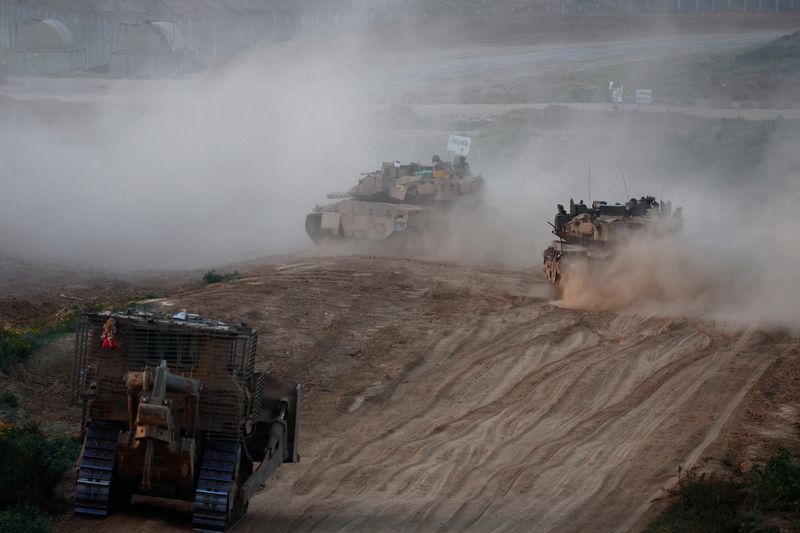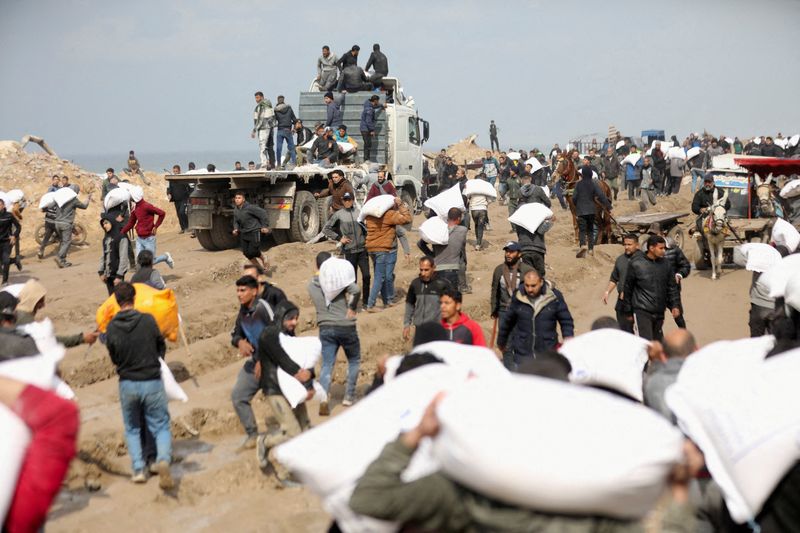By Ahmed Mohamed Hassan and Nidal al-Mughrabi
CAIRO (Reuters) -Mediators expected to reconvene in Cairo as soon as Sunday and search for a formula acceptable to Israel and Hamas for a lasting ceasefire in Gaza, sources with knowledge of talks said, as pressure mounted for a pause in fighting by Ramadan.
Israeli and Hamas delegations were expected to arrive in Cairo on Sunday, two Egyptian security sources said, though another source briefed on the talks said Israel would not send a delegation until it got a full list of hostages who are still alive.
Hopes for the first pause in fighting since November rose this week after a previous round of talks mediated by Qatar and Egypt in Doha and indications from U.S. President Joe Biden that agreement was close.
Hamas has not backed away from its position that a temporary truce must be the start of a process towards ending the war altogether, the Egyptian sources and a Hamas official said.
However, the Egyptian sources said assurances had been offered to Hamas that the terms of a permanent ceasefire would be worked out in second and third phases of the deal. The duration of the initial pause, a phase expected to last about six weeks, had been agreed upon, the sources said.
Hamas did not immediately respond to a request for comment regarding the assurances and whether they were sufficient to move forward with the six-week pause.
"When it comes to ending the war and pulling out forces out of Gaza, gaps remain unbridged," a Palestinian official familiar with mediation efforts said. The official did not immediately confirm the Cairo talks.
A senior U.S. administration official said on Saturday that the framework for a six-week pause was in place, with Israel's agreement, and now depended on Hamas agreeing to release hostages it has held in Gaza since its attacks on southern Israel on Oct. 7.
"The path to a ceasefire right now literally at this hour is straightforward. And there's a deal on the table. There's a framework deal. The Israelis have more or less accepted it," the official told reporters. "The onus right now is on Hamas."
For its part, Israel will not take part in more talks until Hamas clarifies the number of hostages slated to go free and how many are still alive, the source briefed on the talks said.
Hamas said this week that in total around 70 captives had been killed due to Israel's military operations.
Israel also wants Hamas to agree to a ratio of Palestinian prisoners to be released in exchange for each hostage, said the source, who declined to be identified further. "No delegation will be going to Cairo until Hamas provides answers," the source said.
A draft proposal indicated progress on a number of issues and proposed an overall ratio of 10 Palestinian prisoners held in Israel for each hostage.
Completion of a truce deal also required an agreement on the pullback of Israeli forces from northern Gaza and a return of residents displaced towards the south of the coastal enclave, the Egyptian sources said, although the source briefed on the talks said that for Israel the return of displaced Palestinians to northern Gaza was not the main holdup.
The draft proposal also included a commitment to boost humanitarian aid to the enclave, suffering crippling shortages of food and medicine and where more than a million people have been displaced from their homes.
It was unclear if an incident on Thursday in which scores of Palestinians were killed as people waited for aid near Gaza City in the north could affect the timing of any deal.
Speaking to reporters about a ceasefire as he left the White House on Friday, Biden said: "We're not there yet."
Nevertheless, the security sources said Egyptian and U.S. negotiators were still confident a partial or complete agreement will be reached by the middle of next week.
Israel, Hamas, Egypt, Qatar, and the U.S. State Department did not immediately respond to requests for comment.
PRESSURE ON HAMAS
After five months of war, Hamas is also under pressure to reach a deal, a U.S. official in Washington and one diplomat in the region said.
Israel's military campaign began in response to the Hamas attack on Oct. 7 that killed 1,200 people and involved the seizure of 253 hostages, according to Israeli tallies.

The war has caused an unprecedented humanitarian crisis, with donor nations turning to air drops of food after aid flows into Gaza dwindled in recent days, U.N. officials say.
This week, the number of Palestinians killed in Gaza since Oct. 7 passed 30,000, health authorities in the enclave said.
